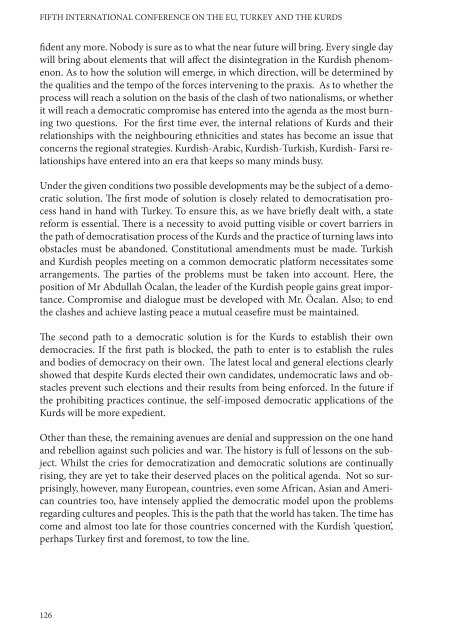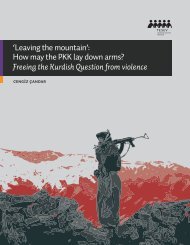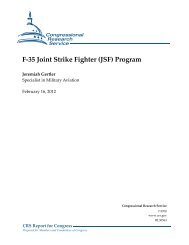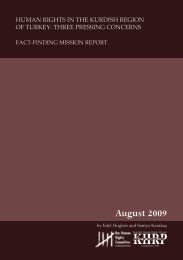FIFTH INTERNATIONAL CONFERENCE ON THE EU TURKEY AND THE KURDS
fifth international conference on the eu, turkey and the kurds
fifth international conference on the eu, turkey and the kurds
You also want an ePaper? Increase the reach of your titles
YUMPU automatically turns print PDFs into web optimized ePapers that Google loves.
<strong>FIFTH</strong> <strong>INTERNATI<strong>ON</strong>AL</strong> <strong>C<strong>ON</strong>FERENCE</strong> <strong>ON</strong> <strong>THE</strong> <strong>EU</strong>, <strong>TURKEY</strong> <strong>AND</strong> <strong>THE</strong> <strong>KURDS</strong><br />
fident any more. Nobody is sure as to what the near future will bring. Every single day<br />
will bring about elements that will affect the disintegration in the Kurdish phenomenon.<br />
As to how the solution will emerge, in which direction, will be determined by<br />
the qualities and the tempo of the forces intervening to the praxis. As to whether the<br />
process will reach a solution on the basis of the clash of two nationalisms, or whether<br />
it will reach a democratic compromise has entered into the agenda as the most burning<br />
two questions. For the first time ever, the internal relations of Kurds and their<br />
relationships with the neighbouring ethnicities and states has become an issue that<br />
concerns the regional strategies. Kurdish-Arabic, Kurdish-Turkish, Kurdish- Farsi relationships<br />
have entered into an era that keeps so many minds busy.<br />
Under the given conditions two possible developments may be the subject of a democratic<br />
solution. The first mode of solution is closely related to democratisation process<br />
hand in hand with Turkey. To ensure this, as we have briefly dealt with, a state<br />
reform is essential. There is a necessity to avoid putting visible or covert barriers in<br />
the path of democratisation process of the Kurds and the practice of turning laws into<br />
obstacles must be abandoned. Constitutional amendments must be made. Turkish<br />
and Kurdish peoples meeting on a common democratic platform necessitates some<br />
arrangements. The parties of the problems must be taken into account. Here, the<br />
position of Mr Abdullah Öcalan, the leader of the Kurdish people gains great importance.<br />
Compromise and dialogue must be developed with Mr. Öcalan. Also; to end<br />
the clashes and achieve lasting peace a mutual ceasefire must be maintained.<br />
The second path to a democratic solution is for the Kurds to establish their own<br />
democracies. If the first path is blocked, the path to enter is to establish the rules<br />
and bodies of democracy on their own. The latest local and general elections clearly<br />
showed that despite Kurds elected their own candidates, undemocratic laws and obstacles<br />
prevent such elections and their results from being enforced. In the future if<br />
the prohibiting practices continue, the self-imposed democratic applications of the<br />
Kurds will be more expedient.<br />
Other than these, the remaining avenues are denial and suppression on the one hand<br />
and rebellion against such policies and war. The history is full of lessons on the subject.<br />
Whilst the cries for democratization and democratic solutions are continually<br />
rising, they are yet to take their deserved places on the political agenda. Not so surprisingly,<br />
however, many European, countries, even some African, Asian and American<br />
countries too, have intensely applied the democratic model upon the problems<br />
regarding cultures and peoples. This is the path that the world has taken. The time has<br />
come and almost too late for those countries concerned with the Kurdish ‘question’,<br />
perhaps Turkey first and foremost, to tow the line.<br />
126





